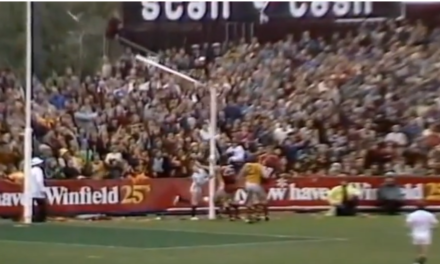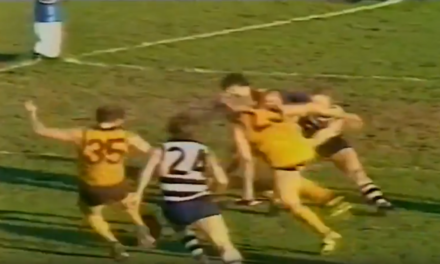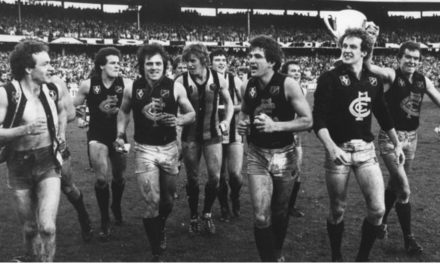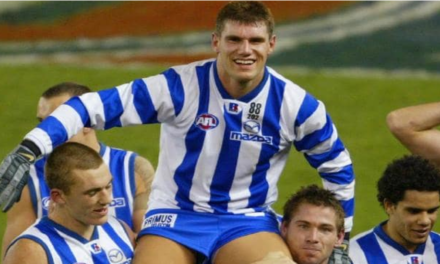Collingwood’s Ross Brewer is jubilant after snapping the winning goal in the 1981 first semi-final against Fitzroy at the MCG. Picture: CHANNEL 7
Rounds Of Our Lives: The greatest of the great semi-finals
With the second week of AFL finals upon us, what better than reminiscing on some of the greatest semi-finals from years gone by to get in the mood before this weekend’s action?
There have been some amazing semi-final moments over the years, from Nick Davis’ final term heroics at the SCG in 2005, to a pulsating extra-time clash at Subiaco two years later.
Because, like a Ross Brewer snap at the MCG, or a match-winning running goal from Brett Burton, so are the Rounds of our Lives.
COLLINGWOOD 19.19 (133) d FITZROY 19.18 (132) (MCG, first semi-final 1981)
Fitzroy’s gallant comeback attempt fell agonisingly short against Collingwood in the 1981 first semi-final, with the Pies prevailing by a single point.
The ‘Roys had put together an impressive season following their wooden spoon in 1980, and knocked out Essendon in the elimination final the previous week.
Their semi-final clash against the Pies was especially heated, given Collingwood had recently recruited Fitzroy stars Graeme Allan and Warwick Irwin. Despite this, Collingwood got off to the hot start, leading by 38 points at half-time.
Fitzroy launched a second-half revival though, thanks to an impressive third term from veteran David McMahon and Matthew Rendell, who both kicked two goals during the quarter.
Garry Wilson and Chris Smith also led the charge, as the Lions kicked six goals to reduce the margin to 14 points at the final change.
McMahon continued to cause headaches for the Pies in the final term, adding another two goals, one which put Fitzroy in front, and another which almost sealed victory.
Seven goals from Fitzroy saw them in front by 10 points deep into time-on, and seemingly set for a famous victory.
But Collingwood hero Peter Daicos had other ideas. The Pies put together an impressive end-to-end play which saw Ross Brewer pin-point Daicos inside 50. He had no trouble slotting the goal, reducing the margin to four points.
Collingwood won the next centre clearance and went forward, where Craig Davis was awarded a free kick for a push in the back. His kick fell short and into a pack of players in the goal square.
Amid the chaos, Brewer took the ball and fired off a quick-fire snap on goal over his shoulder, which put the Pies two points up.
A frantic final couple of minutes followed, but despite numerous forward thrusts the Lions were unable to kick a winning goal, falling short by a single point when the final siren sounded.
It was heartbreak for Fitzroy in front of 85,000 fans at the ‘G, and full-back Laurie Serafini later recalled feeling numb for three days after the loss.
A buoyant Collingwood meanwhile, went on to win a similarly thrilling preliminary final against Geelong, finally falling to arch-rival Carlton in the grand final by 20 points.
HAWTHORN 16.17 (113) d ESSENDON 15.15 (105) (MCG, second semi-final 1984)
Two weeks before Essendon’s 1984 grand final win over Hawthorn, the Hawks won a classic second semi-final against the Bombers at the MCG.
In a tight affair for almost the entire match, often acclaimed as one of the greatest finals ever played, the Bombers held a narrow lead with less than five minutes remaining.
But at the 24-minute mark, Hawks skipper Leigh Matthews gathered the ball on the lead inside 50, sold some candy and then handballed to a running Richard Loveridge, who kicked a running goal to reclaim the lead.
The Bombers were unable to claw their way back, and to add insult to injury, Rodney Eade goaled for Hawthorn on the siren to secure an eight-point win.
Robert DiPierdomenico starred with four goals for the Hawks, while a gallant Tim Watson was magnificent for the Bombers with 30 touches and two goals.
The win sent Hawthorn to the grand final for the second straight year, while the Bombers had to face Collingwood in a preliminary final at Waverley the next week.
This proved no issue for Essendon, who romped home by 133 points and then went on to famously exact revenge against the Hawks in the grand final by 24 points.
SYDNEY 7.14 (56) d GEELONG 7.11 (53) (SCG, second semi-final 2005)
In perhaps the greatest individual quarter in finals history, Nick Davis willed the Swans to a remarkable comeback victory in the 2005 second semi-final against Geelong.
In a scrappy, low-scoring affair at the SCG, Sydney trailed Geelong by 23 points with less than 14 minutes remaining after a goal to the Cats’ David Johnson. Considering the Swans had only kicked three goals in three-and-a-half quarters, a Swans victory looked highly unlikely.
But Davis, who earlier that quarter cost Sydney a goal through a lapse in concentration, decided to pay back the Swans in the best way possible – by kicking four match-winning goals in a row.
He kicked one via curling snap from a stoppage, then another one through a set shot 20 metres from goal.
When Davis kicked another impressive goal from a stoppage in time-on, the deficit was reduced to three points and the Swans could smell blood. The Cats tried desperately to hold on to their narrow three-point lead, and with only seconds left in the match, a stoppage was held deep inside the Swans’ forward 50.
While Geelong looked to clear the ball, there was no stopping Davis, who perfectly sharked the tap from the stoppage and burst through a pack to kick a magnificent goal.
“I see it, but I don’t believe it!” commentator Anthony Hudson famously exclaimed.
Davis had single-handedly won the match for the Swans, who two weeks later went on to break their 72-year premiership drought.
COLLINGWOOD 13.15 (93) d WEST COAST 10.14 (74) (Subiaco, second semi-final 2007)
Collingwood and West Coast have played their fair share of classic finals (including another thriller last week), and their 2007 second semi-final clash is up there with best of them.
Both sides were missing key players – the Eagles their midfield royalty in Chris Judd, Ben Cousins and Daniel Kerr, and Collingwood ruckman Josh Fraser.
But this didn’t stop the Eagles and Pies putting on a gripping contest. Despite the Eagles breaking away to a nearly four-goal lead late in the third term, the Pies hit back with three late goals.
A tight fourth quarter could not split the teams, who were level on 72 points when the final siren went after an incredible last couple of minutes when the ball remained locked near the Collingwood goal.
Just the second extra-time in finals history ensured, which was dominated by the Pies. They kicked three goals to the Eagles’ two behinds in the additional 10 minutes, finishing 19-point winners.
Dane Swan was huge for the Pies with 38 disposals, while a young Matt Priddis showed he could lead the next-generation Eagles midfield with 37 touches.
ADELAIDE 20.10 (130) d MELBOURNE 17.16 (118) (MCG, second semi-final 2002)
In a topsy-turvy, high-scoring affair at the MCG, Adelaide won a dramatic second semi-final against the Demons in 2002.
Despite finishing in the top-four, Adelaide was forced to play a home final in Melbourne due to contractual obligations.
This seemed to fire up the Crows, who kicked eight goals in the first quarter to establish a 40-point lead.
But Melbourne would not go down without a fight, scoring 15 goals over the next two quarters to set up a 22-point advantage at three-quarter time.
This time it was Adelaide’s turn to fight back. Tyson Edwards got things started by kicking a vital goal just before three-quarter time. It was the first of five consecutive goals to the Crows, who soon regained the lead through an Andrew McLeod goal with 10 minutes remaining.
When Mark Stevens goaled a minute later, Adelaide’s lead grew to eight-points.
David Neitz kicked a steadier for the Demons, but Brett Burton ran into an open goal soon after to seal a memorable Adelaide victory.











